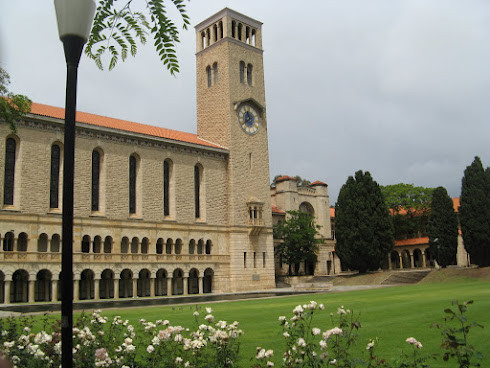 Above: The University of Western Australia.
Above: The University of Western Australia.PERTH, WA (Nov. 5, 2008) — Students at the University of Western Australia are certain that the election of Barack Obama will make a difference in how the United States is perceived around the world, but many aren’t sure how much of a difference, policy-wise, a change in the American administration will have.
A quick poll of six UWA students showed the interest in the US election ranged from “high” to “none,” and also indicated that many Australians think the American polls will help them reflect on racism in their own country.
Like elsewhere in the world, in Australia universities are hotbeds of the left, so it might not be surprising that Lewis, a 21-year-old biophysics major, was at a table advertising a socialist rally under a banner asking if the U.S. election would really change anything.

“There’s a lot of enthusiasm about Obama and I think it reflects that people want change and an end to the whole agenda of the Bush Administration and the end of the imperialist agenda of the U.S. the whole world over,” Lewis said. “But I don’t think it will fundamentally change things. Obama is still pro-war. He support the war in Afghanistan, in fact wants to send more troops there.”
Kimberley, who just turned 18, also thought Obama’s election would improve the world’s perception of the United States.
“(The perception) is very negative at the moment, but I think Obama coming in today could help,” she said, noting that she had not followed the election as closely as she would have liked to. “The vibe was just so much Obama. It got built up so big that I think it might have put me off.”
Natalie and Hayley, both 21, were chatting in the UWA café. The UK-born Natalie had spent to 2007-2008 school year in Montréal, so she had been among those deluged with political advertising. She compared the hype over Obama to that when Tony Blair was elected the UK prime minister in 1997.
“It’s all about something new, something different,” Natalie said. “You’ve got a black guy, he’s intelligent …” (Hayley interjects that “McCain’s boring.”) “McCain is 72, he’s an old fuddy-duddy, a bit. I guess he’s got Sarah Palin to appeal …" (Hayley interjects again: “She’s an idiot!” Both giggle.)
Not that everyone had the some political insight as Hayley and Natalie. Danny, 26, a recent immigrant from Hong Kong, obviously had different things on his mind.
“I don’t bother,” he said. “Personally it doesn’t interest me, but I don’t know about anyone else. If they get the black guy … Obama? … as president, it will change because they hadn’t got a black president before.”
The issue of race was brought up more readily in Perth than it has been in the major U.S. media.
“Could be a lot of people don’t like voting for a black person,” said a male in his 70s, researching microfilm copies of the Times of London in the UWA library. “As for McCain, I think his age is a factor against him.”
“There’s been more publicity for Obama, definitely, in Australia,” Hayley said. “I saw more of him and his family. So he stood out for me more than McCain did.”
Both Hayley and Natalie noticeably paused when asked if they could one day see an Aboriginal prime minister in Australia.
“I don’t know, not for a long time,” Hayley said. “I think we’re quite a bit behind America in the whole acceptance (of minorities).”
Hayley and Natalie disagreed as to whether another racial minority, such as Asian immigrants, could put a PM in Canberra. “I think that’s the same (as the Aboriginal question),” Hayley said. “There’s a lot of racists in Australia.”
But Natalie had a bit more hope: “I think that’s more realistic, maybe in the next 50 years — there’s still so much of a ‘White Australia’ (attitude). You see England, England is multi-cultural. You come here, it isn’t.”
Hayley agreed.
“There’s so much separation, even in Uni, you see whites and Asians in different groups,” she said.
Lewis said he hopes Obama’s election would not turn out to be a wasted opportunity.
“ Masses of people have been raised to support Obama,” he said. “And I think if those people’s hopes aren’t met, which will probably be the case, it might lead to the kind of mass protests we saw in the Sixties.”
No comments:
Post a Comment